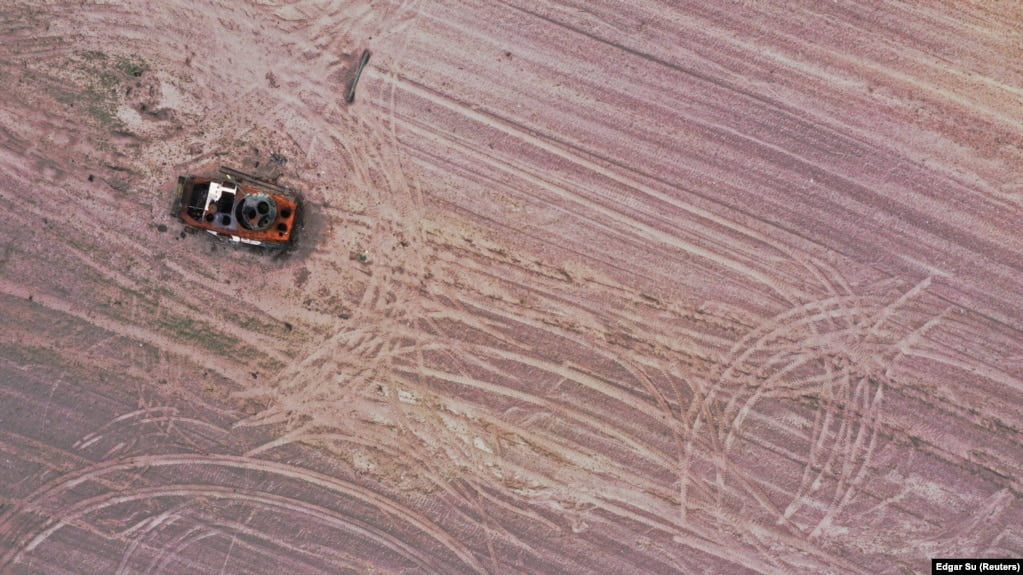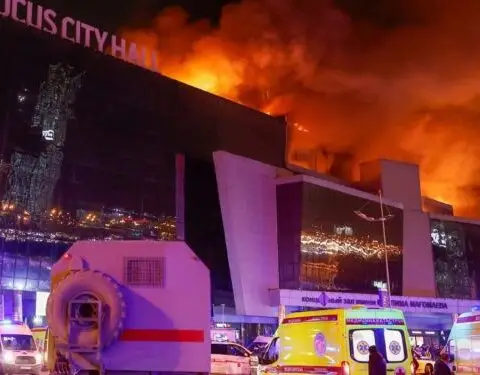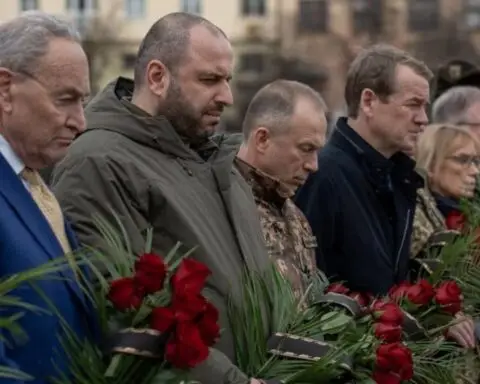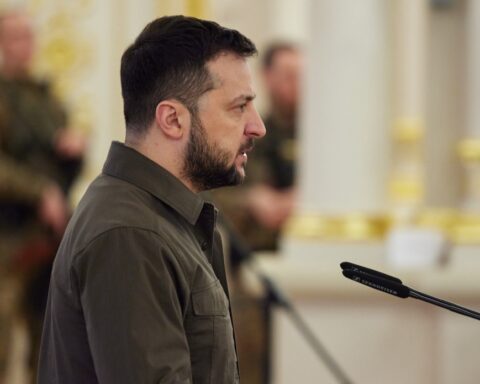Russia continued to pour forces and equipment into its all-out offensive in eastern Ukraine, where it seeks to encircle Ukrainian troops in two cities, as Kyiv warned that the country is facing an existential battle that could determine its fate.
Ukrainian President Volodymyr Zelenskiy said the situation in the Donbas is “extremely difficult” as Russia steps up its assault.
“All the power of the Russian Army, which still remains in them, has been thrown into the attack,” Zelenskiy said in his nightly address on May 24.
Russian forces were advancing from three directions to encircle the easternmost sector of the Ukrainian-held Donbas pocket, with focus on the the twin cities of Severodonetsk and Lysychansk, located on the eastern and western banks of the Siverskiy Donets River.
“The enemy has focused its efforts on carrying out an offensive in order to encircle Lysychansk and Severodonetsk,” said Serhiy Hayday, governor of Luhansk Province, where the two cities are located. Hayday said on May 25 that six civilians had been killed by Russian shelling in Severodonetsk the previous night.
Ukraine’s military said it had repelled nine Russian attacks on May 24 in the Donbas, where Moscow’s troops killed at least 14 civilians, using aircraft, rocket launchers, artillery, tanks, mortars, and missiles.
Ukrainian Defense Ministry spokesman Oleksandr Motuzyanyk said on May 24 that battles being fought in eastern Ukraine could determine its future.
“Now we are observing the most active phase of the full-scale aggression which Russia unfolded against our country,” Motuzyanyk told a televised briefing. “The situation on the [eastern] front is extremely difficult, because the fate of this country is perhaps being decided [there] right now.”
Workers digging through the rubble of an apartment building in Mariupol, the Sea of Azov port city that was besieged and shelled relentlessly for months by Russian forces, found 200 decomposing bodies in the basement, Ukrainian authorities said on May 24.
Petro Andryushchenko, an adviser to the mayor, did not say when they were discovered, but the number of victims makes it one of the deadliest known attacks of the war.
Meanwhile, British intelligence warned that Russia’s blockade of Ukraine’s key port of Odesa has caused grain supply shortfalls that cannot be compensated by overland exports.
WATCH: Veronika from Ukraine’s Donetsk Region lost her family in an attack on the high-rise residential building where she lived. Hit by shrapnel, she was left in a coma. Kira from Kharkiv was hit by shelling when she was walking in a park. Her friend was killed.
The British Defense Ministry assessed in its daily bulletin on May 25 that as long as the threat of Russia’s naval blockade keeps deterring access by commercial shipping to Ukrainian ports, “the resulting supply shortfalls will further increase the price of many staple products.”
On May 24, European Commission chief Ursula von der Leyen called for talks with Moscow on unlocking wheat exports trapped in Ukraine as a result of Russia’s sea blockade.
“Russian warships in the Black Sea are blockading Ukrainian ships full of wheat and sunflower seeds,” von der Leyen told the World Economic Forum in Davos, Switzerland, on May 24.
Russia is using food supplies as a weapon with global repercussions, just like it does in the energy sector, von der Leyen said.
The war and Western sanctions against Russia have sent the price of grain, cooking oil, fertilizer, and energy soaring.
Many countries, including some of the world’s poorest, count on Russia and Ukraine, which together account for nearly one-third of the global wheat supply, for more than half of their wheat imports.
Zelenskiy said it will take time and “a lot of extraordinary efforts” for Ukrainians to break Russia’s advantage in equipment and weapons, as he again called for Western countries to supply more heavy weapons.
Providing rocket-propelled grenades, tanks, anti-ship, and other weapons to Ukraine is the best investment to maintain stability in the world and prevent many “severe crises” that he said Russia is still planning.
Amid the fighting, two top Russian officials appeared to acknowledge that Moscow’s advance has been slower than expected, though they vowed the offensive would achieve its goals.
Nikolai Patrushev, secretary of Russia’s Security Council, said the Russian government “is not chasing deadlines.” And Defense Minister Sergei Shoigu told a meeting of a Russia-led security alliance of former Soviet states that Moscow is deliberately slowing down its offensive to allow residents of encircled cities to evacuate.
Russian officials also announced that Moscow’s forces had finished clearing mines from the waters off Mariupol and that a safe corridor will open on May 25 for the exit of as many as 70 foreign ships from Ukraine’s southern coast.






